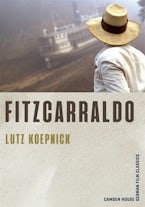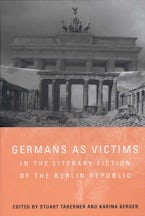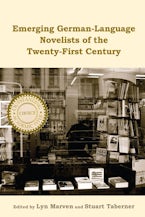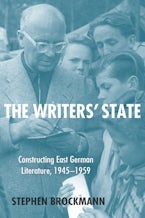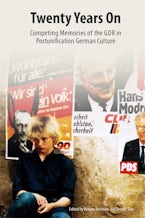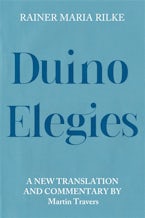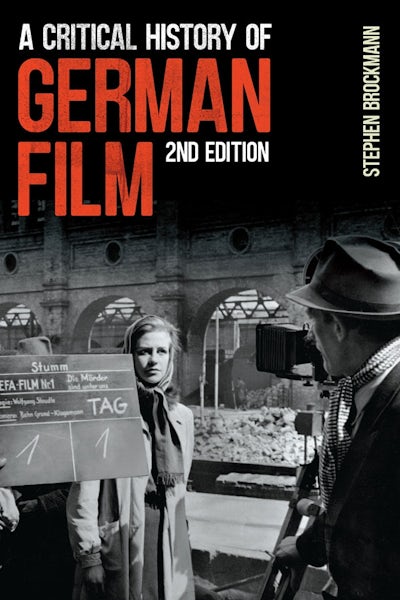
Title Details
690 Pages
22.8 x 15.2 cm
47 b/w illus.
Series: Studies in German Literature Linguistics and Culture
Series Vol. Number:
207
Imprint: Camden House
A Critical History of German Film, Second Edition
- Description
- Contents
- Author
- Reviews
The most comprehensive, readable history of German cinema now appears in an expanded, up-to-date new edition that is particularly useful for students and teachers of German film history.
From early masterpieces such as The Cabinet of Dr. Caligari (1920) and Metropolis (1927) to the post-1945 films of Fassbinder, Herzog, and Wenders, German film constitutes a crucial part of the history of world cinema. It helped to shape Hollywood cinema and had a major impact on other cinemas as well. This tried and tested book, popular in college classrooms and among general-interest readers, is the most comprehensive and readable introduction to the history of German cinema, specifically designed to meet the needs of those who want a comprehensible, accessible introduction to the subject. There is no other book that covers the history of German cinema in the same depth and also explores the genesis and meaning of the most important masterpieces in German film history. It does so in chapters devoted to each of thirty-two individual films and in seven interchapters that provide context for historical periods from early German cinema to postunification. The book now appears in an improved, expanded, and up-to-date second edition that covers five additional films, expands the coverage of women's cinema, and brings the history of filmmaking in Germany up to the present moment. The book is specifically designed to appeal to cinema aficionados and for use in college classrooms, where it has been greeted with acclaim by students and teachers alike.
Stephen Brockmann is Professor of German at Carnegie Mellon University.
From early masterpieces such as The Cabinet of Dr. Caligari (1920) and Metropolis (1927) to the post-1945 films of Fassbinder, Herzog, and Wenders, German film constitutes a crucial part of the history of world cinema. It helped to shape Hollywood cinema and had a major impact on other cinemas as well. This tried and tested book, popular in college classrooms and among general-interest readers, is the most comprehensive and readable introduction to the history of German cinema, specifically designed to meet the needs of those who want a comprehensible, accessible introduction to the subject. There is no other book that covers the history of German cinema in the same depth and also explores the genesis and meaning of the most important masterpieces in German film history. It does so in chapters devoted to each of thirty-two individual films and in seven interchapters that provide context for historical periods from early German cinema to postunification. The book now appears in an improved, expanded, and up-to-date second edition that covers five additional films, expands the coverage of women's cinema, and brings the history of filmmaking in Germany up to the present moment. The book is specifically designed to appeal to cinema aficionados and for use in college classrooms, where it has been greeted with acclaim by students and teachers alike.
Stephen Brockmann is Professor of German at Carnegie Mellon University.
Introduction: Critical Film History and German Studies
PART ONE: EARLY GERMAN FILM HISTORY 1895-1918
Early German Film History 1895-1918: Historical Overview
Der Student von Prag (1913) and Learning to Look
PART TWO: WEIMAR CINEMA 1919-1933
Weimar Cinema 1919-1933: Historical Overview
Das Cabinet des Dr. Caligari (1920) or Film as Hypnosis
Der letzte Mann (1924) or Learning to Move
Die Abenteuer des Prinzen Achmed (1926): The Birth of the Feature-Length Animation Film
Metropolis (1927) or Technology and Sex
Der blaue Engel (1930) and Learning to Talk
M (1931) or Sound and Terror
PART THREE: NAZI CINEMA 1933-1945
Nazi Cinema 1933-1945: Historical Overview
Triumph des Willens (1935): Documentary and Propaganda
Hallo Janine (1939): Dancing and Singing to Happiness
Die große Liebe (1942) or Love and War
PART FOUR: GERMAN CINEMA AT THE ZERO HOUR 1945-1949
German Cinema at the Zero Hour 1945-1949: Historical Overview
Die Mörder sind unter uns (1946): The Rubble Film
PART FIVE: POSTWAR EAST GERMAN CINEMA 1949-1989
Postwar East German Cinema 1949-1989: Historical Overview
Sonnensucher (1958) or Searching for the Socialist Sun
Spur der Steine (1966) or Traces of Repression
Die Legende von Paul und Paula (1973) or East Germany in the '70s
Solo Sunny (1980) or Even Socialism Can't Stave Off Loneliness
PART SIX: POSTWAR WEST GERMAN CINEMA 1949-1989
Postwar West German Cinema 1949-1989: Historical Overview
Grün ist die Heide (1951) and the Reinvention of the German Homeland in Living Color
Die Brücke (1959): Film and War
Der junge Törless (1966) or Recapturing Tradition
Aguirre, der Zorn Gottes (1972): Film and the Sublime
Deutschland im Herbst (1978) or Film and Politics
Die Ehe der Maria Braun (1979) or West Germany Rebuilds
Die Blechtrommel (1979) or Coming to Terms with the Nazi Past
Die bleierne Zeit (1981): Film and Terrorism
Männer (1985) and the New German Film Comedy
Der Himmel über Berlin (1987): Berlin, City of Angels
PART SEVEN: GERMAN FILM AFTER REUNIFICATION 1990-2019
German Film after Reunification 1990-2019: Historical Overview
Der bewegte Mann (1994) or West German Self-Absorption
Rossini (1997) or West German Self-Absorption Criticized
Lola rennt (1998) or Cool Germania
Good Bye Lenin! (2003) or Farewell to the Socialist Motherland
Gegen die Wand (2004) or Germany Goes Multicultural
Das Leben der anderen (2006) or the Power of Art
Toni Erdmann (2016) and the Passing of a Generation
Conclusion: The Future of German Cinema?
Index
PART ONE: EARLY GERMAN FILM HISTORY 1895-1918
Early German Film History 1895-1918: Historical Overview
Der Student von Prag (1913) and Learning to Look
PART TWO: WEIMAR CINEMA 1919-1933
Weimar Cinema 1919-1933: Historical Overview
Das Cabinet des Dr. Caligari (1920) or Film as Hypnosis
Der letzte Mann (1924) or Learning to Move
Die Abenteuer des Prinzen Achmed (1926): The Birth of the Feature-Length Animation Film
Metropolis (1927) or Technology and Sex
Der blaue Engel (1930) and Learning to Talk
M (1931) or Sound and Terror
PART THREE: NAZI CINEMA 1933-1945
Nazi Cinema 1933-1945: Historical Overview
Triumph des Willens (1935): Documentary and Propaganda
Hallo Janine (1939): Dancing and Singing to Happiness
Die große Liebe (1942) or Love and War
PART FOUR: GERMAN CINEMA AT THE ZERO HOUR 1945-1949
German Cinema at the Zero Hour 1945-1949: Historical Overview
Die Mörder sind unter uns (1946): The Rubble Film
PART FIVE: POSTWAR EAST GERMAN CINEMA 1949-1989
Postwar East German Cinema 1949-1989: Historical Overview
Sonnensucher (1958) or Searching for the Socialist Sun
Spur der Steine (1966) or Traces of Repression
Die Legende von Paul und Paula (1973) or East Germany in the '70s
Solo Sunny (1980) or Even Socialism Can't Stave Off Loneliness
PART SIX: POSTWAR WEST GERMAN CINEMA 1949-1989
Postwar West German Cinema 1949-1989: Historical Overview
Grün ist die Heide (1951) and the Reinvention of the German Homeland in Living Color
Die Brücke (1959): Film and War
Der junge Törless (1966) or Recapturing Tradition
Aguirre, der Zorn Gottes (1972): Film and the Sublime
Deutschland im Herbst (1978) or Film and Politics
Die Ehe der Maria Braun (1979) or West Germany Rebuilds
Die Blechtrommel (1979) or Coming to Terms with the Nazi Past
Die bleierne Zeit (1981): Film and Terrorism
Männer (1985) and the New German Film Comedy
Der Himmel über Berlin (1987): Berlin, City of Angels
PART SEVEN: GERMAN FILM AFTER REUNIFICATION 1990-2019
German Film after Reunification 1990-2019: Historical Overview
Der bewegte Mann (1994) or West German Self-Absorption
Rossini (1997) or West German Self-Absorption Criticized
Lola rennt (1998) or Cool Germania
Good Bye Lenin! (2003) or Farewell to the Socialist Motherland
Gegen die Wand (2004) or Germany Goes Multicultural
Das Leben der anderen (2006) or the Power of Art
Toni Erdmann (2016) and the Passing of a Generation
Conclusion: The Future of German Cinema?
Index
"Brockmann's analysis of films that are both representative and accessible results in a text that offers the kind of broad understanding of German film history that is a prerequisite for further work in the field. As a result, [the book] can serve as an ideal text for teaching. Its strength lies precisely in its breadth: it is an engagingly and clearly written introduction to the distinct periods of German film history and the key moments and significance of some of the best-known films belonging to that history. . . . Th[e] second edition . . . only increases the usefulness of the text for those looking for an introduction to the field as well as those engaged in teaching the material." GERMAN STUDIES REVIEW
"As a scholarly achievement, Brockmann's book displays erudition through its deft integration of manifold strains of academic discourse into a cohesive and compelling study... Critical History of German Film incorporates a prodigious amount of information, informed by the breadth of scholarship on German cinema, and made interesting through Brockmann's own keen acumen and cogent analyses." DIE UNTERRICHTSPRAXIS/TEACHING GERMAN
Paperback
9781571133267
April 2020
$69.95 / £59.99
Ebook (EPDF)
9781787448964
April 2020
£19.99 / $24.95
Title Details
690 Pages
2.28 x 1.52 cm
47 b/w illus.
Series: Studies in German Literature Linguistics and Culture
Series Vol. Number:
207
Imprint: Camden House


